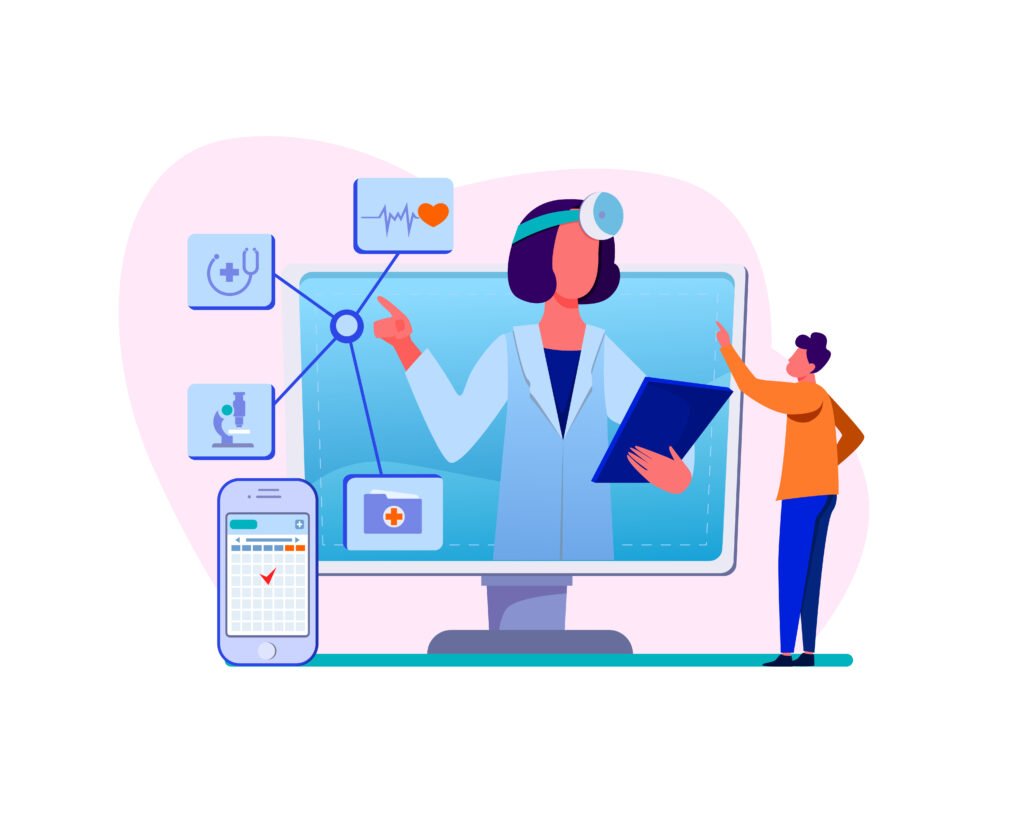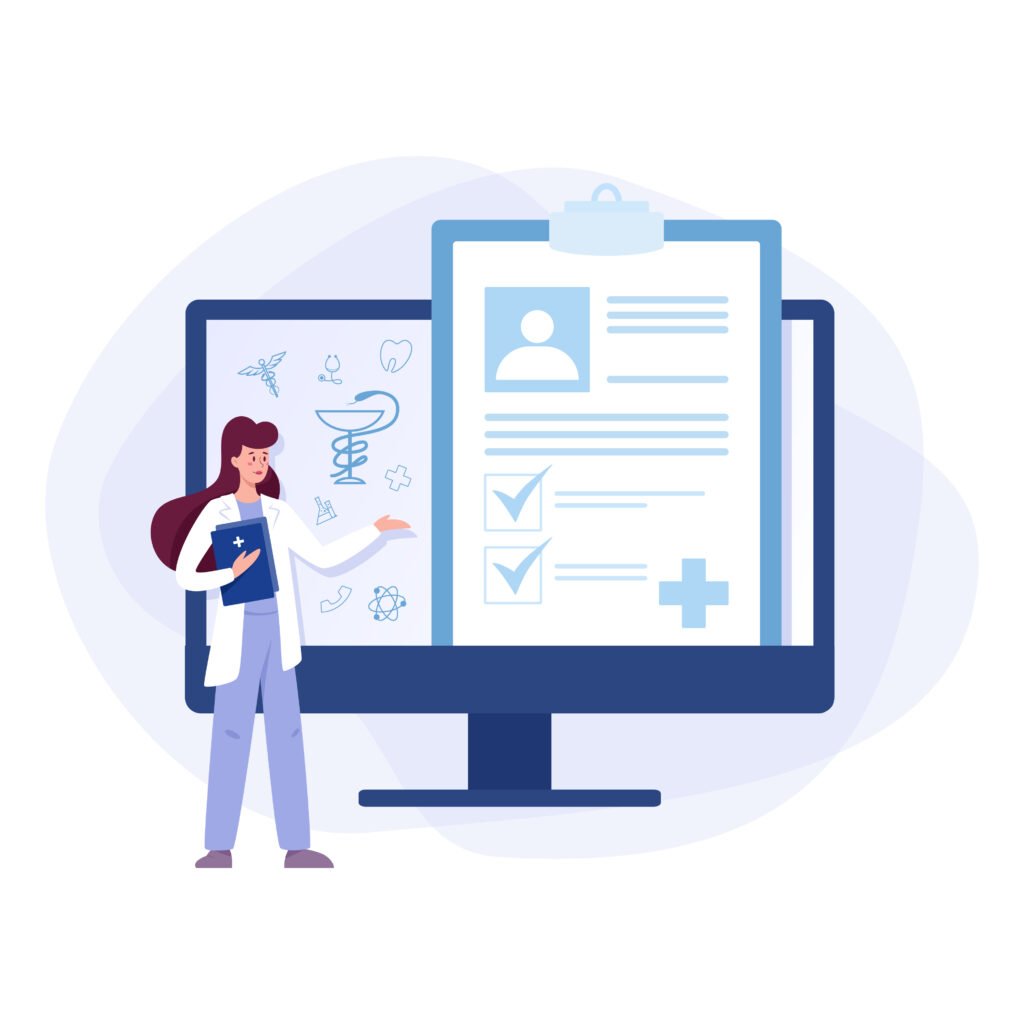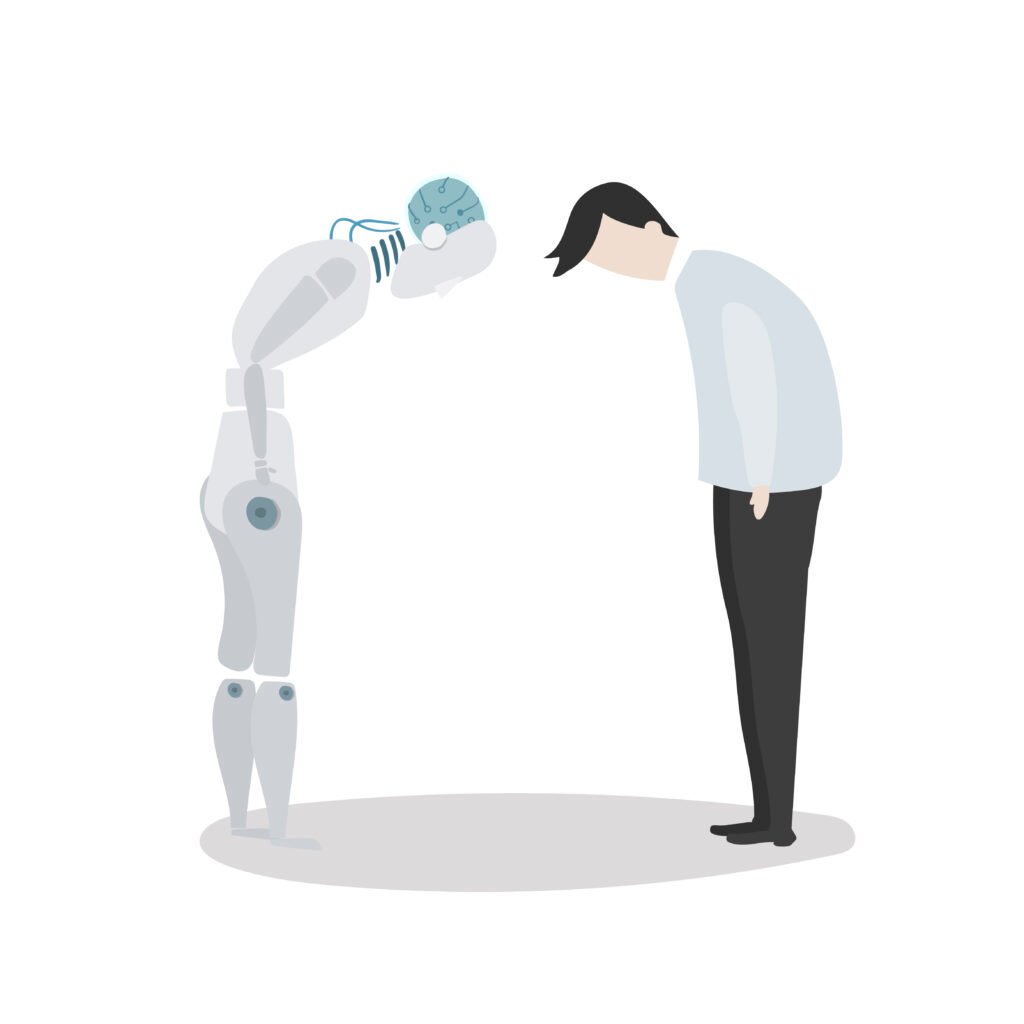How AI Revolutionizes Healthcare, Diagnostics, and Patient Care
16 Aug 2023
Igor Kelly

It is hard to overemphasize the fear humans experience when seeking help at the hospital. Patients bring their worries, anxieties, and questions to the doctor, asking: “Will everything be all right?” Today, since artificial intelligence is involved in many healthcare services, patients’ first concern is whether it will show the same level of empathy and attention as a human would in direct communication.
How does artificial intelligence (AI) revolutionize the way we approach healthcare services? What potential does it offer to enhance medical practices? Read the article to learn more.
AI in Healthcare: Real-World Examples
Digital transformation is rapidly changing the outer world. How is AI used in healthcare? Digital patient files and intelligent systems are on the rise in clinics, hospitals, and medical practices.
Let’s briefly overview the AI-driven tools currently available for healthcare providers and how they help medical workers in real life.
Benefits of AI in healthcare:
- AI-powered diagnostics. IBM Watson for Oncology uses AI to assist oncologists in analyzing large volumes of medical literature and patient data to recommend personalized treatment options for cancer patients.
- Virtual health assistants. Buoy Health’s AI-powered virtual health assistant provides symptom-checking and triage services, offering users personalized health advice and recommendations based on their reported symptoms.
- Predictive analytics for patient monitoring. Excel Medical’s WAVE Clinical Platform utilizes AI to predict patient deterioration and identify early signs of sepsis, enabling healthcare providers to intervene proactively and improve patient outcomes.
- Image analysis and radiology. Aidoc’s AI platform analyzes medical images, such as CT scans and X-rays, to help radiologists detect abnormalities, prioritize critical cases, and expedite diagnosis.
- Drug discovery and development. Atomwise uses AI-driven molecular screening to identify potential drug candidates, accelerating drug discovery processes and offering new possibilities for treating various diseases.
- Personalized treatment planning. Tempus employs AI to analyze patient genomic data and clinical information to tailor personalized treatment plans for cancer patients, improving treatment efficacy and outcomes.
- Natural language processing in electronic medical records (EHR). Google’s DeepMind Health uses natural language processing to extract relevant information from medical records, facilitating faster data access and aiding clinical decision-making.
- Remote patient monitoring. Current Health’s wearable devices use AI algorithms to remotely monitor patients’ vital signs, providing continuous health data to healthcare providers and enabling early intervention for high-risk patients.
These examples demonstrate how AI-driven tools in healthcare are revolutionizing medical practices, improving patient care, and driving advancements in the field. The tech industry provides various software development services to support healthcare providers: build custom healthcare systems from scratch, ensure interoperability of distributed systems and data sources, implement features that increase patient engagement or enable streamlined billing, enhance system security, automate manual and paper-based operations.
AI in Medical Imaging
AI in medical imaging analysis helps healthcare providers to analyze medical images, such as X-rays, MRIs, and CT scans, enabling early detection of abnormalities and assisting healthcare professionals in diagnosing conditions like tumors, fractures, and cardiovascular diseases.
In terms of early disease detection, healthcare AI applications can:
- Analyze patient data, including genetic information and medical histories, to identify individuals at high risk of certain diseases or conditions, such as cancer, diabetes, or heart disease, allowing for early intervention and prevention.
- Analyze tissue samples and pathology slides, aiding pathologists in detecting early signs of diseases like cancer, thereby facilitating quicker and more accurate diagnoses.
- Analyze speech patterns, facial expressions, and behavioral data to detect early signs of mental health conditions such as depression, anxiety, and schizophrenia, enabling timely intervention and support.
- Continuously monitor various health parameters. These include heart rate, blood pressure, and sleep patterns. AI-driven wearables help detect deviations from normal patterns that may indicate potential health issues.
- Analyzes large-scale biological data, such as genomics and proteomics, to identify potential biomarkers associated with early disease development, aiding in early detection and personalized treatment plans.
With the help of powerful mainframe computers, artificial intelligence, and deep learning methods, analysts can search for huge data collections. Specific patterns detected can provide valuable information on comparable patient cases, probable disease courses, and suitable therapies.
AI in Electronic Health Record (EHR) Management
The medical devices industry is being fueled by the rising demand for home care, early diagnosis, and improved patient outcomes. GlobalData’s report “Artificial Intelligence in Medical Devices: AI-assisted EHR/EMR” reveals that over 450,000 patents have been filed and granted in this sector in the past three years alone.
Efficient healthcare workflows with AI bring about significant advancements in data discovery, complex findings extraction, and utilizing big data to generate personalized treatment recommendations. We can highlight two main beneficial points of how AI enhances EHR software.
- EHR systems can efficiently analyze and interpret medical records, test results, and other clinical data, enabling healthcare providers to make well-informed decisions and personalized treatment plans based on real-time information.
- EHR systems can automate data entry, extraction, and organization, reducing the burden on healthcare professionals and ensuring accurate and up-to-date patient records.

Before adopting a state-of-the-art system, hospital staff requires additional training on the EHR practice management platform and its workflows. Effective user and employee training before and during EHR adoption is important to mitigate the challenges associated with low productivity and avoid a state where users become dissatisfied and frustrated due to a lack of skills.
However, as the healthcare sector is poised to transform, these growing difficulties will eventually resolve. To positively impact the healthcare system, care providers should be able to utilize AI-enabled EHR management effectively.
AI in Drug Discovery
Since the beginning of the 20th century, up to 100 million people have died from the flu, COVID-19, and HIV pandemics alone — and bacteria are constantly developing new antibiotic resistance. How could AI help pharmaceutical companies bring new products to market faster?
Drug discovery and design optimization
AI can expedite drug discovery by analyzing vast datasets and predicting potential drug candidates with higher efficacy and safety profiles. For instance, Insilico Medicine’s AI-driven platform used deep learning to design a novel drug candidate for fibrosis, significantly accelerating the early stages of drug development.
Clinical trial optimization
AI can optimize clinical trials by identifying suitable patient populations, improving trial design, and predicting patient responses. For example, Tempus uses AI to analyze patient data, enabling personalized clinical trial enrollment based on genetic profiles, thus enhancing trial efficiency and shortening the time-to-market for new treatments.
Regulatory compliance and safety assessment
AI can assist pharmaceutical companies in navigating complex regulatory requirements and predicting potential safety issues during drug development. BioSymetrics’ AI-based platform can analyze preclinical data and identify safety concerns, ensuring compliance with regulatory guidelines and preventing delays during approval.
The role of AI in drug discovery is to accelerate the identification of potential drug candidates and optimize the drug development process. By analyzing vast datasets, AI algorithms can predict the effectiveness and safety of potential compounds, enabling researchers to prioritize the most promising candidates and reduce the time and cost involved in bringing new drugs to market.
AI for Personalized Care
AI in healthcare enhances diagnosis accuracy, improves treatment planning, streamers administrative tasks, and facilitates medical research. These measures lead to more effective healthcare practices. And given the spreading use of AI in medicine, the need for dialogue between the patient, doctor, and AI grows in direct proportion.
For healthcare providers, it becomes essential to explain the rationale behind AI-driven decisions to build trust and transparency. AI-enabled personalized medicine must ensure patients’ active participation in their treatment journey and make informed decisions about their health.
AI-powered tools enable medical professionals to offer personalized treatments tailored to each patient’s unique needs, for example, in the following cases:
- Cancer treatment. AI-powered tools analyze genomic data and medical history to identify genetic mutations and biomarkers related to the cancer type, enabling personalized treatment plans like targeted therapies or immunotherapies with improved efficacy and fewer side effects.
- Chronic disease management. AI-driven tools continuously monitor patient data, including glucose levels or blood pressure, to adjust treatment regimens and interventions based on individual responses. This optimizes disease management and prevents complications for patients with diabetes or cardiovascular diseases.
- Drug allergy and sensitivity prediction. AI algorithms assess medical history, genetic makeup, and medication responses to predict drug allergies or sensitivities, enabling medical professionals to avoid adverse reactions and ensure patient safety during treatment.
- Precision surgery planning. In complex surgical cases, AI aids medical professionals by analyzing patient-specific imaging data from scans like CT or MRI, facilitating precise surgical mapping, reducing complications, and enhancing surgical outcomes.
In all these cases, AI-powered tools enable medical professionals to move beyond a one-size-fits-all approach, providing improved accuracy in diagnostics and personalized treatments that consider each patient’s unique characteristics and needs. This tailored approach ultimately leads to improved patient outcomes, reduced treatment side effects, and more efficient healthcare delivery.

Overcoming Challenges and Ethical Considerations
Despite the abovementioned benefits, AI in medicine has many limitations that must be considered.
One of the main limitations is the lack of human intuition and experience often required when making complex decisions. In many cases, while artificial intelligence can mimic human decision-making, it cannot replicate the experience and intuition that comes with years of practice. In addition, AI is often dependent on the available data, which can be a limitation in some instances. For example, AI may not diagnose a disease correctly if insufficient data about a particular patient exists.
Also, ethical considerations of AI in healthcare raise questions. The technology can be unreliable regarding regulations compliance, and it is crucial to ensure that it can make accurate decisions to avoid potential problems. In April 2021, the EU Commission proposed the first legal framework for AI. It recommends that AI systems, which can be used in different applications, are analyzed and classified according to the risk they pose to users. The different levels of risk are subject to more or less regulation.
To reach a healthy and data-safe balance between human expertise and AI assistance, the responsible users must answer questions about the information security of AI systems:
- Which data is transmitted in the applications and where?
- How securely do AI systems use patient data?
- How can the decisions of AI systems be comprehensible for patients?
All of these questions must be answered to ensure that artificial intelligence, one of the core technologies of the future, is used safely with appropriate guidelines and healthcare standards.
The Future of AI in Healthcare Delivery
We can say with certainty that with the rapid progress in the field of AI, the use of AI-based applications continues to increase — and not only in the industry. Given AI’s impact on the economy and the world of work is growing along with its importance, it is essential to keep a close eye on this transformation, its conditions, and its effects. Dr. David Classen, Pascal’s chief medical information officer, acknowledges the fragmented healthcare system and sees patient-enabled tools as potential game-changers in managing healthcare needs.
AI-driven tools can potentially lead to the following general advancements.
- More precise diagnostics and personalized treatments. AI analyzes extensive patient data for accurate diagnoses and tailored treatment plans, improving outcomes.
- Streamlined operations and cost savings. AI automates tasks, optimizes resource allocation, and enhances healthcare efficiency, leading to cost savings.
- Accelerated drug discovery and clinical trials. AI expedites drug development and improves clinical trial design, benefiting patients globally.
Researchers also still determine how successful the use of AI-driven healthcare research insights will be. Some active ingredients designed with the help of AI are already being investigated in clinical trials.
However, it remains to be seen whether these substances are indeed better and have fewer side effects than traditionally developed drugs. It is also unclear whether the development process is faster and more cost-effective. The use of AI in healthcare is still in its infancy, and it will take time before it can fully catch up with conventional methods.
Conclusion
AI and the transformation of healthcare go hand in hand. From diagnostics to treatment, AI is impacting every aspect and benefits various healthcare stakeholders:
- For patients: improves diagnoses, treatment plans, and accessibility to healthcare services through remote monitoring and virtual consultations.
- For doctors/researchers: aids disease diagnosis, image analysis, and outcome prediction by identifying hidden patterns in extensive data.
- For healthcare administrators: streamlines administrative tasks, optimizes resources, and enhances data-driven decision-making.
- For institution owners: reduces operational costs, boosts patient satisfaction, and drives innovation in healthcare.
To conclude, AI in healthcare is a game-changer, empowering all stakeholders to provide more efficient, precise, and patient-centric care while driving innovation in the medical field.
If you want to adopt custom medical software that improves health outcomes, educates patients, and automates workflows while meeting industry-specific data and security standards, reach out for a consultation. Lightpoint will happily provide full-cycle software development services to help you build next-gen healthcare solutions.


